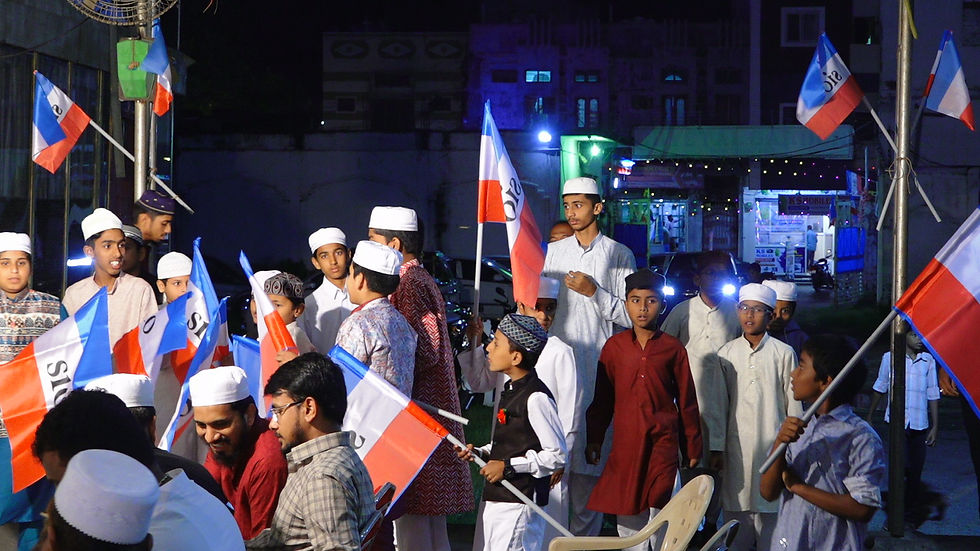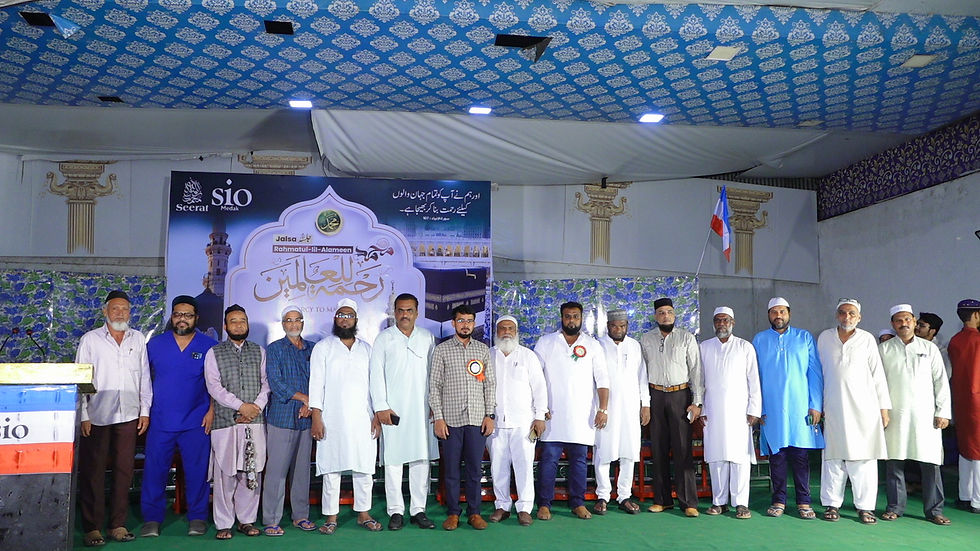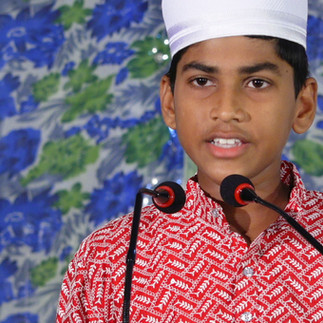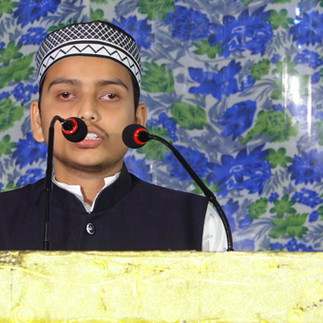In the Footsteps of the Prophet (PBUH): Medak's Youth Answer the Call at SIO's Seerat-un-Nabi Gathering
- Seerat Editorial Team

- Sep 24, 2025
- 4 min read
An atmosphere of profound reverence and youthful energy filled the Crystal Garden in Medak on a recent evening, as community members, both young and old, gathered for a landmark event. This was no ordinary assembly; it was the first-ever Jalsa Seerat-un-Nabi (a gathering to celebrate the life of the Prophet Muhammad, peace be upon him) organized in the city by the Students Islamic Organisation of India (SIO). The significance of this inaugural event was palpable, marking a new chapter in community engagement and youth mobilization in the region.

The proceedings began with the soul-stirring recitation of the Holy Qur'an by Mohammed Ahmed Ali, setting a contemplative tone for the evening. The event was expertly hosted and its proceedings guided by Shaikh Abdul Basheer, who welcomed the attendees to an evening dedicated to drawing inspiration from the most perfect of lives.
The gathering was a testament to the SIO's commitment to its foundational mission: to engage and prepare the next generation for the betterment of society. The organization, a nationwide student body established on October 19, 1982, has long worked for the social progress and development of India's student fraternity.
This event in Medak, while local in its setting, was a clear expression of a much larger, national strategic vision. For an organization with a presence stretching from Punjab to Kerala and a mission centered on the "reconstruction of the society in the light of Divine Guidance", choosing the universally revered theme of the Prophet's (PBUH) life, SIO created an inclusive and spiritually resonant platform. This Jalsa was not merely an event; it was the planting of a seed for a durable, grassroots presence aimed at nurturing future leaders.
The Keynote Address: Faraz Ahmed on Applying Prophetic Wisdom to Modern Life

The centerpiece of the evening was the detailed keynote address delivered by the chief guest, Brother Faraz Ahmed, a state representative of SIO. His speech moved beyond historical reverence, focusing instead on the timeless and practical relevance of the Prophet's (PBUH) life for the youth of the 21st century. He presented a compelling case for how prophetic wisdom offers a clear roadmap for navigating the complex challenges of the modern world.
The Sunnah as a Practical Blueprint for Contemporary Challenges

Brother Faraz Ahmed's primary argument was a powerful call to action: for youth to successfully confront the unique pressures and dilemmas of the current era, it is essential that they adopt the Sunnah, the traditions and practices of the Prophet Muhammad (PBUH), in their practical, daily lives. The speech framed the Sunnah not as a set of abstract historical rituals, but as a living, dynamic blueprint for ethical decision-making, personal discipline, and social interaction. It was a direct appeal to transform faith from a passive identity into an active, guiding force in one's life.
The Crucial Balance of Deen and Duniya
Perhaps the most resonant part of the address for the young audience was the guidance on maintaining a balance between Deen (faith and religious obligations) and Duniya (worldly affairs and pursuits). This is a central challenge for students who must navigate academic pressures, career aspirations, and social expectations while staying true to their spiritual commitments. By addressing this directly, Ahmed positioned SIO as an organization that understands and provides practical guidance for the real-world dilemmas of its constituency. This focus on equilibrium, rejecting both extreme asceticism and unchecked materialism, is crucial for preparing youth to be effective, contributing members of society who are also spiritually grounded.
A Platform for the Future: The Empowered Voices of Medak's Youth

While the keynote address provided the guiding framework for the evening, the true spirit of the Jalsa was illuminated by the active and enthusiastic participation of Medak's own youth. A significant portion of the program was dedicated to speeches from a new generation such as Mohammed Farhan, Ahmed Mohammed Mudassir Khan, Moiz Ahmed Khan, and many others. Their collective presence on the stage was a powerful statement in itself, showcasing the event as a platform for empowerment rather than just passive listening.
From these diverse young speakers, a single, unifying message emerged with clarity and conviction: the inseparable link between education (Taleem) and character (Akhlaq). They argued passionately that for education to be truly transformative, it "must be accompanied by the rectification of morals and character". This profound insight, articulated by the youth themselves, goes to the heart of SIO's mission.
Understanding the Movement
To fully grasp the significance of the Jalsa in Medak, it is essential to understand the organization behind it. The Students Islamic Organisation of India is not a local club but a formidable national movement with a rich history and a clear, ideologically driven purpose. Founded in 1982, SIO has grown into one of India's most prominent student organizations, with a presence in nearly every state and a membership that cuts across various backgrounds, all united under a common cause.
This Jalsa should not be viewed as an end in itself, but as the beginning of a sustained journey. It marks the start of a concerted effort by SIO to engage, mentor, and empower the student community of Medak, providing them with the tools, knowledge, and moral clarity to excel in their personal lives and contribute positively to society. The energy and enthusiasm displayed by the young speakers and attendees are a clear indication that this message has found ground.
Ultimately, the gathering reinforced one of the most powerful truths articulated by its speakers: that the youth are indeed the "future of the nation". By providing them with the "best of examples" to follow and a platform to develop their voices, the SIO has initiated a vital conversation in Medak. It is a conversation about character, purpose, and responsibility. The seeds of change planted on this historic evening hold the promise of a future where the youth of Medak, guided by the light of prophetic wisdom, will rise to become leaders, innovators and architects of a more compassionate, just, and peaceful society.



























